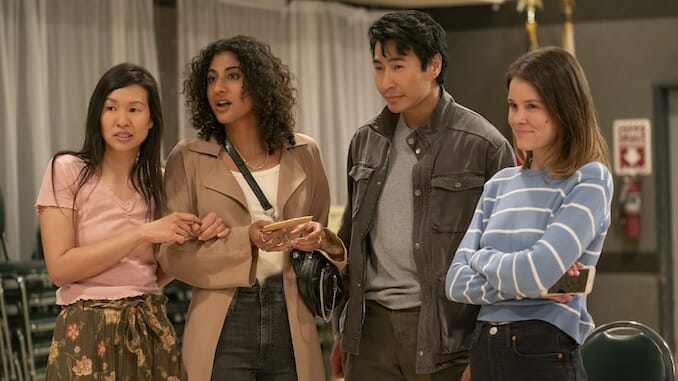Amazon’s Compelling As We See It Lets People with Autism Speak Their Truth
Photo Courtesy of Amazon Prime Video
Almost every first few dates in a courtship are going to be awkward. Partners try to highlight their strengths and attributes as they try to subtly explain who they are and what they’re like and why they’re suitable mates.
But in an episode of As We See It, the new Amazon Prime Video series, lead character Jack (Rick Glassman) is trying a different tactic: He wants to show new paramour Ewatomi (Délé Ogundiran) that he is a normal guy who likes normal things (like normal over-priced date spots), and can hold normal conversations. But the restaurant he obsessively researched online and then chose for this outing is too loud, the pizza he’s eating is too expensive and tastes different from the kind he gets at his regular joint, and his stilted behavior and defensiveness only exacerbate the thing about himself that he’s trying so hard to show is no big deal: Jack has Autism Spectrum Disorder. Ewatomi does not. But she was able to crack that case way before Jack revealed it to her, even though he wasn’t aware of it.
As We See It, which is executive producer Jason Katims’ adaptation of the Israeli show On the Spectrum, is the latest entry into the discourse over what TV gets right and wrong about people with Autism. So often on television shows, people with Autism are shown as young children (SundanceTV’s The A Word), quirky young adults with smothering parents (Netflix’s ATypical) or savants with no filters (ABC’s medical drama, The Good Doctor). Sometimes they’re not officially diagnosed as people on the spectrum but are just seen as the quirky sidekicks (see Jim Parsons’ Sheldon from the CBS comedy The Big Bang Theory or Danny Pudi’s Abed from NBC’s Community).
It’s rare to see a character on the spectrum played by an actor on the spectrum, especially a character who is coming to terms with what that means regarding how this person interacts with the world. (All the raised hands emojis on that front go to the Netflix docu-series Love on the Spectrum and actually Autistic performer Josh Thomas’ too-beautiful-for-this-world canceled Freeform series, Everything’s Going to Be Okay. Both shows addressed this and, coincidentally, both shows are created by Austalians). In most of these cases, the characters are coddled by their parents and/or peer groups, protected from the outside world, and welcomed for their eccentricities even if they themselves cannot always recognize how their own lack of awareness or societal cues may hurt someone or themselves.
As We See It takes a different approach and, in doing so, fills in a gaping hole for stories of people with ASD: grown adults simply adulting.
The cheese-adverse Jack has a job and lives in a suburban Los Angeles apartment with two of his childhood friends, who also fall somewhere on the Autism spectrum: Violet (Sue Ann Pien), a unicorn-loving, makeup tutorial-addicted Arby’s employee who so badly wants to be treated as a popular girl prototype that she’s fallen prey to every love advice column ever written, and Harrison (Albert Rutecki), an agoraphobic who doesn’t understand why it’s deemed inappropriate to be friends with the tween boy who lives upstairs.
They have a caretaker in Sosie Bacon’s Mandy, who herself is not on the spectrum but is sometimes a barely functioning adult. But, for the most part, willingly or not, these three have been thrust into the world of adulthood. And guess what? They make the same mistakes that just about all 20-somethings make. Violet loses her virginity to the wrong guy, and is distraught that she’s blown off by women she wants to befriend. Harrison hates change, and it’s hard for him to break from a routine and explore new surroundings. Jack has to figure out how to process the information that his father, Lou (Joe Mantegna), has terminal cancer.
-

-

-

-

-

-

-

-

-

-

-

-

-

-

-

-

-

-

-

-

-

-

-

-

-

-

-

-

-

-

-

-

-

-

-

-

-

-

-

-








































